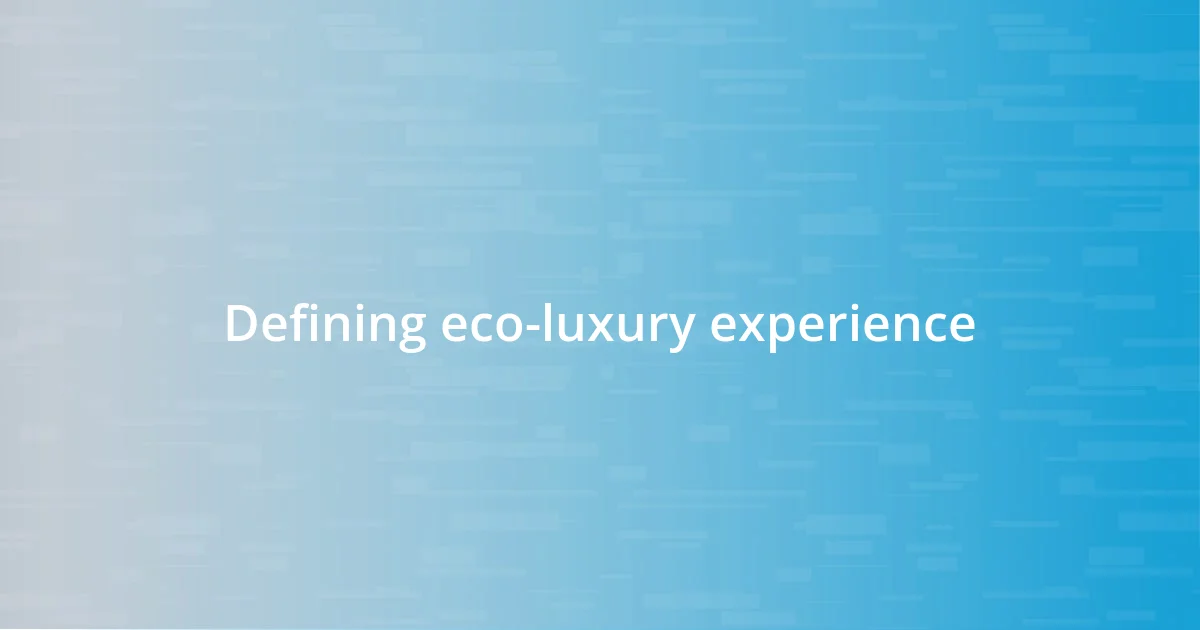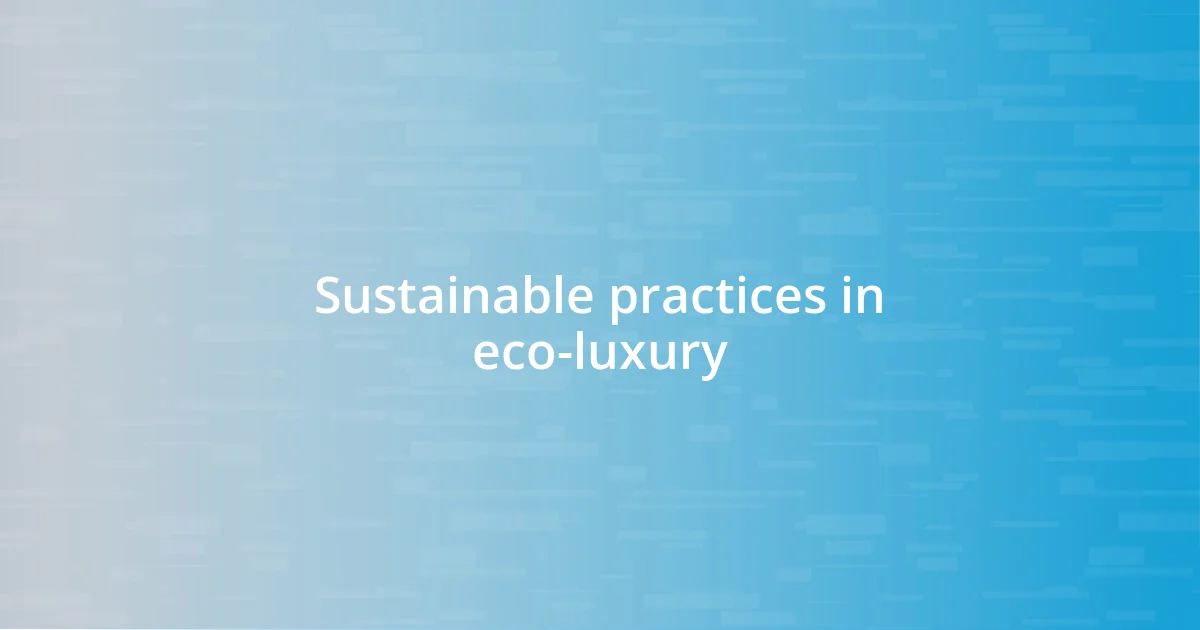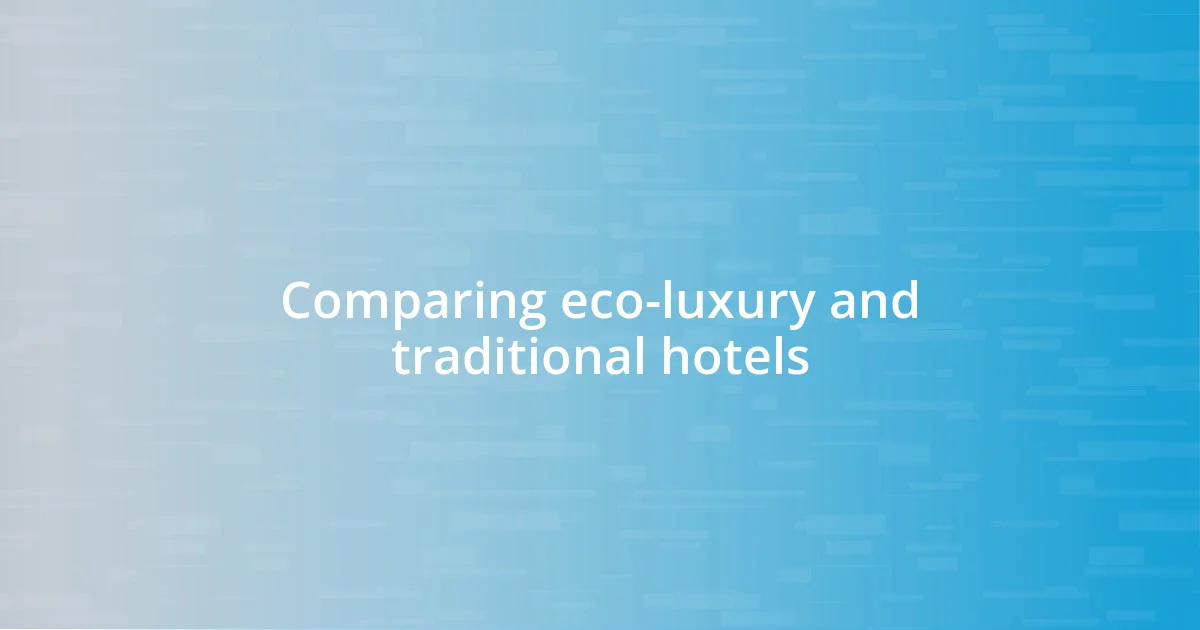Key takeaways:
- Eco-luxury hotels blend high-end comfort with sustainable practices, offering unique experiences such as organic dining and eco-friendly accommodations that respect both the environment and local cultures.
- Key features include sustainable materials, locally-sourced cuisine, renewable energy use, community engagement, and wellness initiatives, redefining luxury with a focus on environmental consciousness.
- Personal experiences at eco-luxury hotels highlight the importance of connection to nature, local communities, and sustainability, contrasting sharply with the often excessive opulence found in traditional luxury hotels.

Understanding eco-luxury hotels
Eco-luxury hotels combine high-end comfort with sustainable practices, a concept I initially found intriguing. During my stays, I was often surprised by how seamlessly luxury and eco-friendliness intertwined—think plush bamboo bedding and solar-powered amenities, which made me wonder: could indulgence and sustainability coexist so beautifully?
I vividly recall one particular eco-resort where the walls were lined with reclaimed wood, and the menus featured organic, locally-sourced ingredients. It felt like dining with the ambiance of nature itself, creating a newfound appreciation for the small footprint we could have while still enjoying a lavish experience. Doesn’t it make you consider how our choices impact the earth’s future?
Understanding eco-luxury hotels also means recognizing their commitment to preserving local cultures and environments. I once participated in a marine conservation activity organized by one hotel where I stayed, fostering a sense of connectedness with both the community and the natural world. Isn’t it refreshing to see luxury hospitality integrated with efforts that genuinely benefit our planet?

Defining eco-luxury experience
Defining the eco-luxury experience can be quite captivating, as it embodies both comfort and conscientiousness. My stays at these hotels revealed to me that it’s not just about exquisite surroundings; it’s about the narratives woven into every detail. I remember sinking into a soft, organic cotton robe after a rejuvenating spa session powered by natural ingredients. That moment illuminated the idea that luxury can also be nurturing for both our bodies and the planet.
To elaborate on this blend of luxury and sustainability, consider these factors:
- Sustainable Materials: High-end accommodations often utilize eco-friendly building materials, like reclaimed wood or bamboo.
- Locally-Sourced Cuisine: Many eco-luxury hotels prioritize farm-to-table dining, featuring fresh, organic, and seasonal produce from nearby farms.
- Renewable Energy Use: It was heartening to see solar panels and wind turbines augmenting the energy needs of these resorts without compromising comfort.
- Community Engagement: Many properties engage in local conservation efforts, fostering a unique connection between guests and the surrounding ecosystems.
- Wellness and Relaxation: Indulging in spa treatments using organic products felt not only luxurious but also respectful to my health and the environment.
These experiences collectively redefine what luxury can mean in today’s environmentally conscious world, aligning comfort with purpose.

Key features of eco-luxury hotels
Staying at eco-luxury hotels truly opens your eyes to how elegance and sustainability can harmonize. I particularly enjoyed a stunning treehouse suite that was perched among the treetops—an unforgettable experience. As I lounged in my private hot tub, surrounded by the sounds of chirping birds, I felt a profound connection to nature. It struck me how accommodations like that not only provide comfort but also encourage guests to appreciate their natural surroundings.
Another thing that impressed me was the emphasis on wellness, often showcased through unique spa offerings. I remember booking a massage that used oils derived from local herbs, which not only relaxed my body but also highlighted the rich botanical heritage of the area. It was remarkable to experience treatments that didn’t just pamper me but also respected the local land and its resources. Doesn’t it make you reflect on how our wellness routines can participate in larger sustainability efforts?
Lastly, these hotels often showcase stunning designs that utilize natural lighting and ventilation to minimize energy use. During one visit, I was amazed by a beautiful infinity pool that elegantly flowed into the horizon, reflecting the landscape. This commitment to innovative design made me feel excited about the possibilities of eco-friendly architecture. It underscores how luxury doesn’t have to be at odds with our planet; instead, it can pave the way for a new vision of indulgence.
| Feature | Description |
|---|---|
| Sustainable Materials | Use of eco-friendly building materials like reclaimed wood and bamboo. |
| Locally-Sourced Cuisine | Emphasis on farm-to-table dining with fresh, organic ingredients. |
| Renewable Energy Use | Incorporation of solar panels and wind turbines to power facilities. |
| Community Engagement | Involvement in local conservation efforts to support surrounding ecosystems. |
| Wellness and Relaxation | Spas utilizing organic products and natural ingredients to enhance guest experience. |

Sustainable practices in eco-luxury
During my stays at eco-luxury hotels, I was completely taken aback by the thoughtful inclusion of sustainable practices in every aspect. For instance, one evening, while enjoying a locally-sourced dinner featuring fresh produce, I marveled at how the chef described each ingredient’s journey from local farms to our table. This connection not only deepened my appreciation for the meal but made me wonder—how often do we stop to think about the sources of our food in everyday life?
The commitment to renewable energy left a lasting impression on me. There was a serene moment when I relaxed on my balcony, soaking in the views, while knowing that the energy powering my suite came from solar panels on the roof. It really made me feel like I was a part of something bigger—a collective effort toward sustainability. Have you ever felt that sense of contribution just by choosing where to stay?
Beyond the physical features, the community involvement initiatives resonated deeply with me. I recall participating in a tree-planting event organized by the hotel, which not only gave me a sense of purpose but also fostered a unique bond with other guests and locals. It’s inspiring to think that each stay can contribute to environmental restoration. Isn’t it comforting to know that luxury can be intertwined with meaningful action?

Personal experiences in eco-luxury
There was one evening when I found myself stargazing from my balcony at an eco-luxury hotel that utilized minimal artificial light. I felt a profound sense of peace as the night sky sparkled with stars, a rare clarity that made me reflect on how environmental considerations can lead to beautiful experiences. Don’t you also crave moments that reconnect you to the universe?
Another memorable experience was joining a cooking class where I learned to prepare local dishes using ingredients harvested from the hotel’s own garden. As I mixed flavors and shared stories with fellow guests, I noticed how our conversations revolved around sustainability and the importance of knowing the provenance of our food. It felt like every bite was infused with the essence of the destination, a reminder that luxury dining can be both exquisite and responsible.
What truly touched my heart was witnessing the hotel’s efforts to support local artisans. During my stay, I browsed a small boutique filled with handmade crafts sourced from surrounding communities. The pride in the artisans’ work was evident, and I felt a sense of gratitude knowing my purchases contributed to the local economy. I often ponder—could we all embrace this deeper connection to the places we visit?

Comparing eco-luxury and traditional hotels
It’s interesting to see how eco-luxury hotels differ from traditional accommodations, particularly in their approach to comfort and aesthetics. During my last stay at a traditional hotel, I found the décor to be overly opulent, which often came off as excessive. In contrast, the eco-luxury hotels I’ve experienced prioritize a minimalist yet inviting atmosphere, where every piece feels deliberate, reminding me of nature’s beauty without overshadowing it. Have you ever noticed how simplicity can sometimes evoke a deeper sense of peace?
Cost is another factor that separates these two types of hotels. While traditional luxury may demand a higher price for visual grandeur, eco-luxury hotels often provide competitive rates that incorporate sustainability without the inflated price tag. This made me feel more at ease when budgeting for my travels, knowing that my choice supported ethical practices. Have you considered how your spending reflects your values when choosing accommodations?
Lastly, the guest experience in eco-luxury hotels is enriched by a sense of community and education that I rarely encountered in traditional settings. One evening, after a delightful farm-to-table dinner, I joined a discussion led by the hotel’s sustainability manager about local ecological challenges and solutions. It wasn’t just a stay; it felt like being a part of a movement. Isn’t it refreshing when travel fosters connections that extend beyond mere sightseeing?
















